What Should I Do When I Get Pulled Over By The Police?
February 13, 2024
•11 min read

Sam Plant
Content Writer
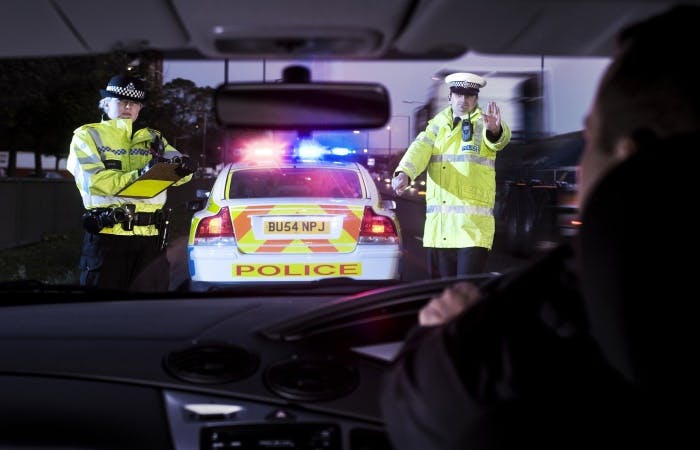
Regardless of whether you're a newly qualified driver or someone who has years of driving experience under your belt, it's likely that you've never been stopped by the police on the roads before. As such, the sight of blue flashing lights and a vehicle attempting to pull you over can be pretty scary—what are you supposed to do next? Not knowing can cause drivers to panic and make silly (and potentially dangerous) mistakes. So, it's vital that you know what to do when you get pulled over by the police.
Our guide aims to outline the situations in which the police are allowed to stop drivers, what they're legally allowed to do and what you should do in these circumstances.
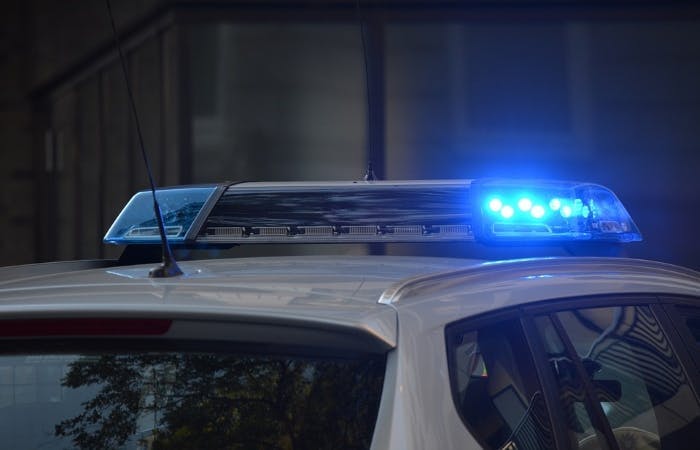
When are the police allowed to stop drivers?
When it comes to being pulled over by the police, sometimes it's pretty easy to see why you've been asked to do so. Regardless of whether it's for an emergency or because stopping for that extra boost of caffeine has made you late for work, speeding is a sure-fire way to get pulled over. In other situations, however, it can be less obvious why the police might want you to pull over. A question many drivers have, then, is, when are the police allowed to stop drivers?
Well, according to GOV.UK, “The police have powers to arrest you anywhere and at any time, including on the street, at home or at work”. In short, the police can pull you over whenever they like on the roads. Once they do so, they're allowed to ask to see your driving licence, insurance and MOT certificate. Don't worry if you don't carry these documents in your car—you're allowed up to a week to take them into your local police station. (Though, if you don't do this within the allotted time, you'll be breaking the law).
The police are also within their rights to give you an on-the-spot fixed penalty if you've committed a minor motoring offence—we'll discuss this further below—and ask you to take a breath test. In more extreme situations, you might also face the prospect of your vehicle being seized by the police if you're suspected of driving without insurance or in-date MOT.
What to do when you're asked to pull over by the police
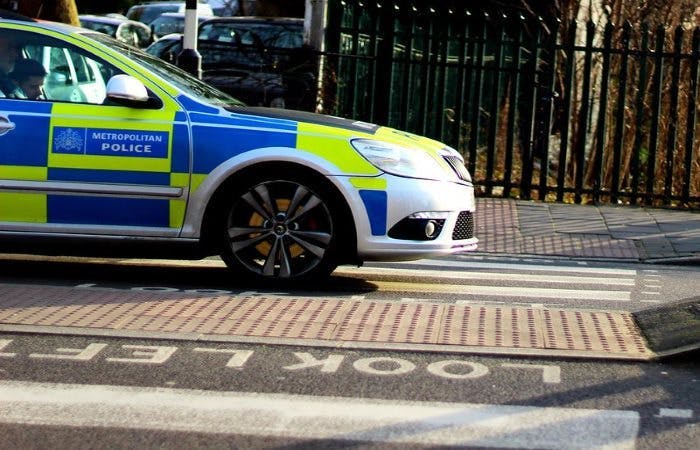
In most cases, if a police car wants you to stop your vehicle, they'll just start flashing their blue lights and possibly start their siren. They will then use their left-hand indicator to let you know that you need to pull over.
Pull over when it's safe to do so
Once you get the signal from the police to pull over, you need to calmly assess the road ahead to find a safe place to pull over. No matter how tempting it is to just slam your foot on the brake, you need to remember where you are. If you stop suddenly, the vehicle behind you might collide into your rear, causing a domino effect. As you can imagine, this would be doubly catastrophic on a dual carriageway or motorway.
Ordinarily, the police asking you to pull over won't just do it on a whim—they'll try to make sure there's a safe place nearby to stop. Of course, if you're near a bend or driving up hill, you'll need to keep going until you find a better place. If this happens, you should signal to the police that you're following their request—that way they'll know you're not trying to make a quick getaway!
Found your safe place? Do your all-around checks, indicate and then come to a stop.
Stay calm
The sight of the police in your interior and exterior mirrors can often send you into a bit of a panic, understandably. Instead of letting the adrenaline send you into a tizzy, however, it's important that you keep a level head. Panicking won't help you, and it certainly won't make communicating with the police any easier! Besides which, being pulled over doesn't necessarily mean you've committed a serious offence. The police might just be pulling you over to let you know that your tail light is broken, for example.
After coming to a stop in your safe place, you need to stay inside your vehicle. The police officer will approach you, so there's no need to get out. They'll need to talk to you, so you might want to roll your window down in preparation. If it's dark, turn on your interior light so that your face is visible. When the police officer approaches your vehicle, keep your hands visible—on the steering wheel—so they know you're not reaching for a weapon.
Be polite
No-one wants to be pulled over by the police. Whether you're in a rush or just eager to be on your way, it's vital that you keep things polite and respectful. Being impatient or rude will not help the situation. If they do end up charging you with something, there's no point in arguing with them—wait until you're in court.
If you're asked to give the police your licence, insurance or MOT documents, then you need to hand them over. Regardless of whether you agree with them for pulling you over, they could arrest you for refusing to comply with their requests. It's not really worth the hassle, is it?
What if I'm pulled over by an unmarked car?
Unmarked police cars are still allowed to ask drivers to pull over, however, the police officer in question has to be wearing a uniform in order to legally carry out the stop.
If you're not entirely sure the unmarked car is a genuine police car, then you're advised to drive to the nearest police station or public area, e.g., a petrol station. Once you've pulled over, make sure your doors and windows are locked until you get a good look at the police officer. If they're wearing a uniform, but you're still not 100% sure they're genuine, you can ask to see their warrant card. Don't worry—they should understand your nerves.
If the person approaching your vehicle isn't wearing a uniform, then it's highly likely that they're an impostor. In this case, your best bet is to stay inside your vehicle and call the police.
Be on your merry way
Once the police have explained why you've been stopped and given you any necessary warnings or charges—we'll delve into this in the next section—it's time for you to head off. (Unless you've been found to be driving under the influence, in which case, you won't be going anywhere!) Now, it's important that you don't just rush off. Regardless of whether you're an experienced driver or not, anyone can get a bit shaken up after being pulled over by the police.
Before you get back on the road, try to take a deep breath or two. When you're ready to set off, make sure you complete your all-around checks and observations—pulling away only when there's enough room to do so.
What might happen once you've been stopped?
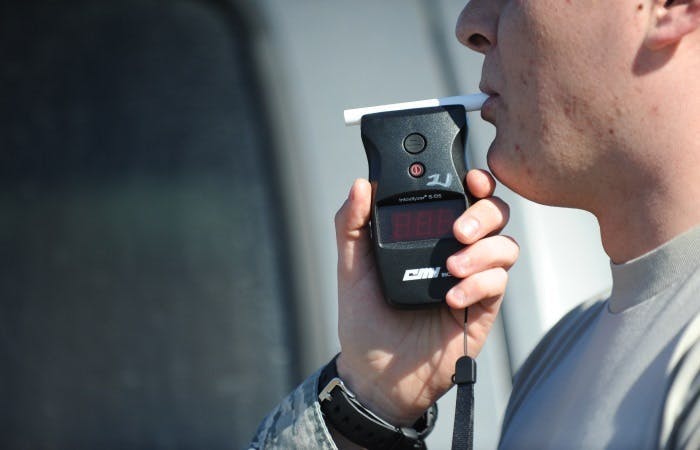
As we've mentioned, the police are within their rights to stop any driver on the road. They're also allowed to ask to see your driving licence, insurance and MOT documents. Beyond that, there are a few potential circumstances that might occur once you've stopped...
Breath test
The police are allowed to ask any driver to take a breath test if they suspect the driver has been drinking, been in an accident or committed a driving offence. Before you start getting righteously angry, it's important to note here that if you refuse to take the test, the police can, quite simply, just arrest you. If you have a reasonable excuse to refuse the test, however—such as a physical or mental condition that prevents you from giving a sample of breath—you'll be allowed to forgo it.
Fortunately, you don't have to wait around too long for the results of the breath test—it's instantaneous! If you're not over any limits, you'll be able to go on your merry way. Drivers who fail, however, will be lugged over to the nearest police station to take another test. If you fail that one, you'll be charged then and there.
If the police stopping you suspect that you've been driving under the influence of drugs or alcohol, they're also allowed to ask you to take a drug test or do a physical test—otherwise known as a field impairment test—which might consist of something like walking in a straight line, turning around and walking back. If you fail the test, you'll be arrested.
As you'd expect, the police will not let you drive your car if you fail a breath test. If this happens, you'll have to get someone else to collect your car.
Minor motoring offences
According to GOV.UK, there are four main reasons why the police can give you a fixed penalty notice for minor motoring offences:
- Careless or inconsiderate driving
- Driving too close to another vehicle
- Not wearing a seatbelt
- Using a mobile phone while driving
If you're caught committing one of these offences, you could be slapped with a fine of up to £200. And that's not all—you could even get penalty points on your licence. If you stack up 12 or more points within 3 years, you'll be disqualified from driving. Bad news for new drivers, however. All it takes is 6 or more points within 2 years of passing your test and you'll have your licence revoked! The police might also just charge you with an offence on the spot.
Of course, it can vary depending on the situation and the police. They may decide not to do anything at all—they might not want to bother with all of the paperwork involved. Alternatively, they might give you a warning or offer driver training, e.g., speeding drivers sometimes get an invite to a speed awareness course.
Looking to challenge your fixed penalty? Well, you're well within your rights to do so. As we've mentioned in our article on common driving offences, however, when you do, you'll have to argue your case in court. If you don't luck out, you'll end up having to pay an even heftier price.
Faults with your vehicle
We always preach the importance of maintaining your vehicle—after all, no-one wants to deal with an unexpected vehicle break down. Unfortunately, that's not all you have to worry about. If the police notice that there's something wrong with your vehicle, e.g., a broken tail light, they'll pull you over and might give you a 'vehicle defect rectification notice'.
After receiving this notice, it's your responsibility to take your vehicle in to get necessary repairs. Once you've done so, you'll need to get physical proof that your vehicle is now good to go, e.g., a receipt from your local garage. You will need to show this to the police within 14 days of receiving the notice.
The police might seize your vehicle
Unfortunately, we've not even reached the end of the powers of the police once they've pulled you over. In fact, if your vehicle is “being used in a way that causes alarm, harassment or distress, for example careless or inconsiderate driving”, the police could seize your vehicle.
If you're prone to parking your vehicle wherever you please, you might want to change your tune ASAP—the police can seize your vehicle if it's parked dangerously, illegally or obstructively. And if you're not driving in accordance with your driving licence—or don't even have one at all—you might as well just wave goodbye to your vehicle right now. It's exactly the same for drivers who aren't insured.
Once your vehicle has been seized by the police, there's a 'release fee' of up to £200, and an additional storage fee of £20 for every day or part day.
How do I prevent being pulled over by the police?
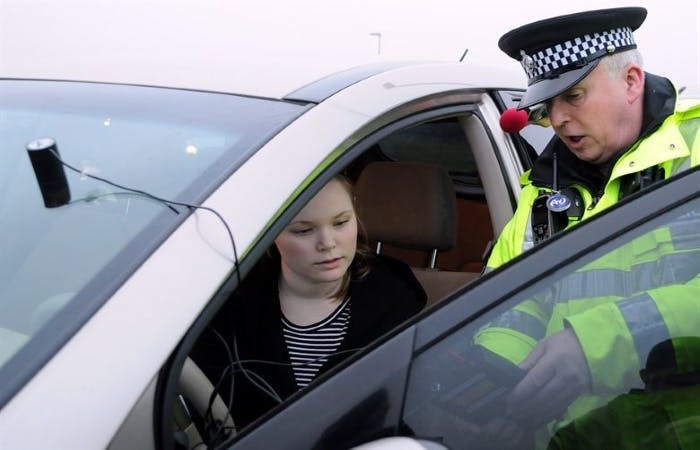
Whilst we can't give you a sure-fire way to avoid the police pulling you over for the entirety of your driving career, we can give you a few pointers to ensure it's less likely to occur.
1. Maintain your car
You can avoid being pulled over for things like having a broken tail light, quite simply, by ensuring your car is properly maintained. It's as simple as doing a once over check of your car every week or so—you can get someone to check your rear lights whilst you're behind the wheel.
2. Follow the rules
Try to ignore your inner rebel and remember that the rules of the road are in place for a reason. So, regardless of how much of a rush you might be in, stick to the speed limits and follow correct lane usage—unpredictable behaviour might lead the police to assume you're driving under the influence.
Not entirely familiar with all the rules of the road? Refresh your theory knowledge with our theory test resources.
3. Leave your car behind
If you're going out with the family or your friends, and you know you're going to be having a tipple or two, you might be better off just leaving your car at home. If you're caught drink-driving, you'll end up with points on your licence, a fine and possibly disqualification from driving altogether.
4. Avoid distractions
Yes, we know, you need to keep your phone at your fingertips just in case you need to send a quippy text or take a quick #instaperfect selfie. That being said, it is illegal to use your phone whilst behind the wheel—even if you're waiting at traffic lights. So, keep it out of sight and out of mind to avoid the temptation.
Similarly, if you're prone to changing radio stations or songs, you might want to think about forgetting it entirely. If you're distracted, it could have a serious impact on your driving.
5. Check you're up to speed
As we've said, the police can ask to see your driving licence, insurance and MOT documents. As such, you should make sure they're all up-to-date. Your driving licence should have the correct address and you should be following your driving licence codes. Similarly, you should ensure your MOT is in date and that you're properly insured to drive.
FAQs
1. Can't I just ignore the police?
No. Regardless of whether you think you haven't done anything wrong, you still need to follow the law. If you're asked to pull over by the police, you need to do so—when it's safe, of course. If you ignore the police, they might assume you're trying to get away and arrest you once they catch up.
2. Can I refuse to take a breath test?
It depends. If you have a mental or physical condition that prevents you from taking a breathalyser, you're well within your rights to refuse the test—as long as you tell the police why. If there's nothing stopping you from taking one, you could still technically refuse it—just know that you'll likely be arrested if you do.
3. The car is unmarked and I don't feel safe pulling over. What should I do?
Your best bet is to keep on driving until you reach a public area, e.g, a petrol station or car park—make sure you signal to let them know you've acknowledged their request. Then, wait and see if the person getting out of the car is wearing a uniform. If they are, and you're still sceptical, ask for their warrant card. If they're not, then call the police, as they're probably an impostor.
4. What happens if I don't have my MOT or insurance documents with me?
You don't need to worry too much. You have up to 7 days to take the requested documents to your nearest police station. Of course, if you fail to do this, then you're breaking the law and you could end up in court facing additional charges or a fine.
5. Do I have to tell the police my address when they pull me over?
Technically, you'll be telling them your address as soon as you give them your driving licence—it has your address displayed on it after all. The police are within their rights to ask for your driving licence, so you can't refuse—unless you fancy being arrested.
6. What's a fixed penalty notice?
If you've been caught committing a minor motoring offence, the police can give you a one-off 'fixed penalty notice', e.g., if you've been caught speeding, you might end up with a fine of £100. You won't be expected to pay it on the spot—you'll have up to 28 days to pay it or request a hearing. If you fail to do so, the fine will increase.
7. How many points can I get on my licence?
It depends on how long you've had your licence for. If you get 6 or more points within two years of passing your driving test, you'll have your licence revoked. Otherwise, you face the prospect of disqualification if you tot up 12 or more points within three years.
8. I didn't realise I wasn't insured, can I still get punished for it?
Yes. Unfortunately, ignorance is not a good argument in court. If you're driving, it's your responsibility to ensure that you're insured. The minimum insurance cover that all drivers must have is third party. If you're not sure you're covered yet, check—you face penalty points, a fine or disqualification otherwise!
Looking for some insurance guidance? Check out our handy articles:
Subscribe for driving advice, offers & more
We'd love to let you know about our courses, news and offers via email. You may unsubscribe at any time.
Star Genie Limited trading as PassMeFast. Company number 10093359
Copyright © 2024 owned by Star Genie Limited
PassMeFast, Blue Tower, MediaCityUK, Salford, M50 2ST
